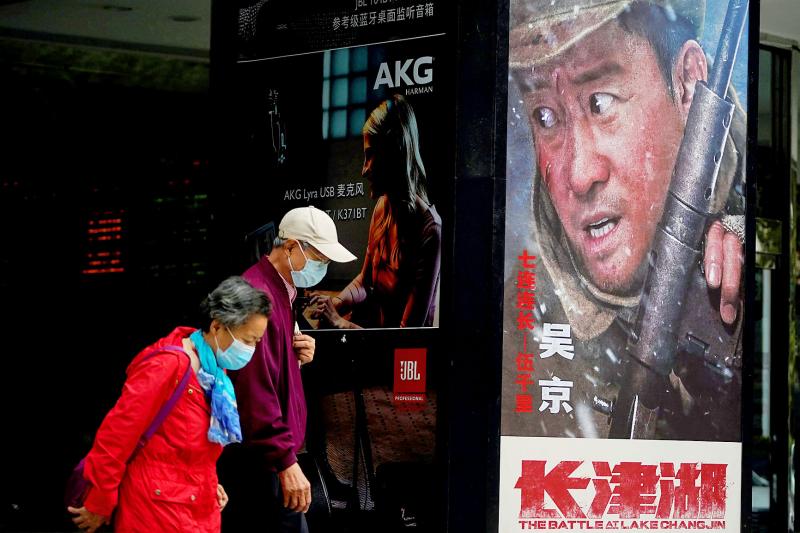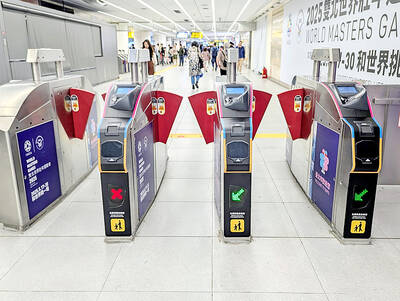China’s tightening supervision of its film and television industries has widened the gap between Chinese and Western content, and has led to a loss of funding and talent in the country, a report by the Mainland Affairs Council said.
China’s Film Administration on Nov. 9 last year released a five-year plan for the development of Chinese films, saying that all films should “praise the Chinese Communist Party [CCP], praise the motherland, praise the people and praise the heroes,” aiming to establish China as a center for filmmaking by 2035.
Movies nominated for Best Picture at the Golden Rooster Awards last year mostly reflected the CCP’s dominant ideology, the council said in its Fourth Quarter Report on the Situation in Mainland China.

Photo: Reuters
The Golden Roosters are China’s top film awards.
The nominations sparked debate on China’s Sina Weibo social media platform, with people voicing concern over the future of Chinese movies, the report said.
The Chinese government has increased its effort to prevent the infiltration of Western values through film and television programs, especially those considered to offend China, the report said.
Tightened restrictions on content also affect the local industry, as Chinese studios interested in telling the stories of the country’s history and people are deterred by unreasonable demands from the government to present its ideology, it said.
Additionally, film and television professionals in China said that as the regulations are unpredictable, promoting the productions in line with the government policies is the only way to guarantee profits, narrowing the development of the industry, the report said.
Professionals in the Chinese film industry said that box-office revenue dropped by one-third last year due to the COVID-19 pandemic, while TV drama productions had come to a virtual halt, the report said, adding that filmmakers and TV producers were deterred from taking advantage of online platforms as their freedom was curtailed by government regulations.
Chinese over-the-top operator iQiyi lost a significant number of subscribers due to a lack of new films, caused by the suspension or termination of drama productions, it said.
Other platforms such as Tencent, Kuaishou Technology and TikTok were also significantly affected, and many industry professionals changed careers, it added.
The five-year plan aims to extend China’s influence in the global film community, but it is not possible in the current industry environment, it said.

A magnitude 6.4 earthquake struck off the coast of Hualien County in eastern Taiwan at 7pm yesterday, the Central Weather Administration (CWA) said. The epicenter of the temblor was at sea, about 69.9km south of Hualien County Hall, at a depth of 30.9km, it said. There were no immediate reports of damage resulting from the quake. The earthquake’s intensity, which gauges the actual effect of a temblor, was highest in Taitung County’s Changbin Township (長濱), where it measured 5 on Taiwan’s seven-tier intensity scale. The quake also measured an intensity of 4 in Hualien, Nantou, Chiayi, Yunlin, Changhua and Miaoli counties, as well as

Credit departments of farmers’ and fishers’ associations blocked a total of more than NT$180 million (US$6.01 million) from being lost to scams last year, National Police Agency (NPA) data showed. The Agricultural Finance Agency (AFA) said last week that staff of farmers’ and fishers’ associations’ credit departments are required to implement fraud prevention measures when they serve clients at the counter. They would ask clients about personal financial management activities whenever they suspect there might be a fraud situation, and would immediately report the incident to local authorities, which would send police officers to the site to help, it said. NPA data showed

ENERGY RESILIENCE: Although Alaska is open for investments, Taiwan is sourcing its gas from the Middle East, and the sea routes carry risks, Ho Cheng-hui said US government officials’ high-profile reception of a Taiwanese representative at the Alaska Sustainable Energy Conference indicated the emergence of an Indo-Pacific energy resilience alliance, an academic said. Presidential Office Secretary-General Pan Men-an (潘孟安) attended the conference in Alaska on Thursday last week at the invitation of the US government. Pan visited oil and gas facilities with senior US officials, including US Secretary of the Interior Doug Burgum, US Secretary of Energy Chris Wright, Alaska Governor Mike Dunleavy and US Senator Daniel Sullivan. Pan attending the conference on behalf of President William Lai (賴清德) shows a significant elevation in diplomatic representation,

The Taipei MRT is to begin accepting mobile payment services in the fall, Taipei Rapid Transit Corp said on Saturday. When the company finishes the installation of new payment units at ticketing gates in October, MRT passengers can use credit cards, Apple Pay, Google Pay and Samsung Pay, the operator said. In addition, the MRT would also provide QR payment codes — which would be compatible with Line Pay, Jkopay, iPass Money, PXPay Plus, EasyWallet, iCash Pay, Taiwan Pay and Taishin Pay — to access the railway system. Currently, passengers can access the Taipei MRT by buying a single-journey token or using EasyCard,